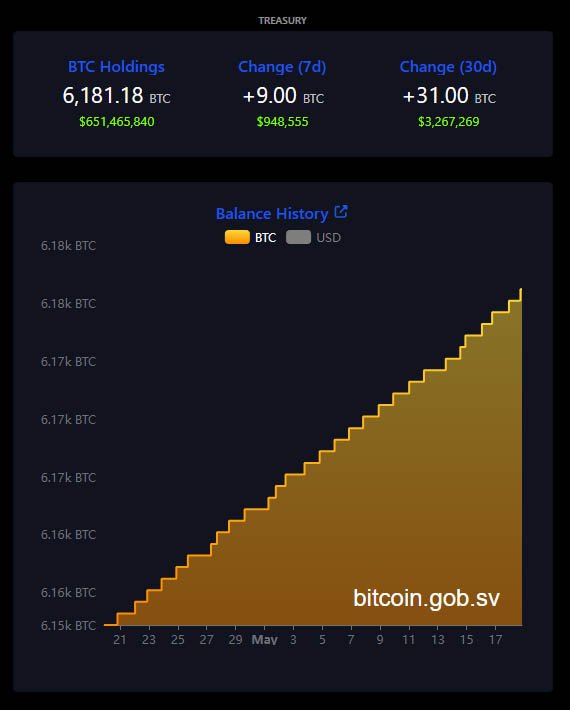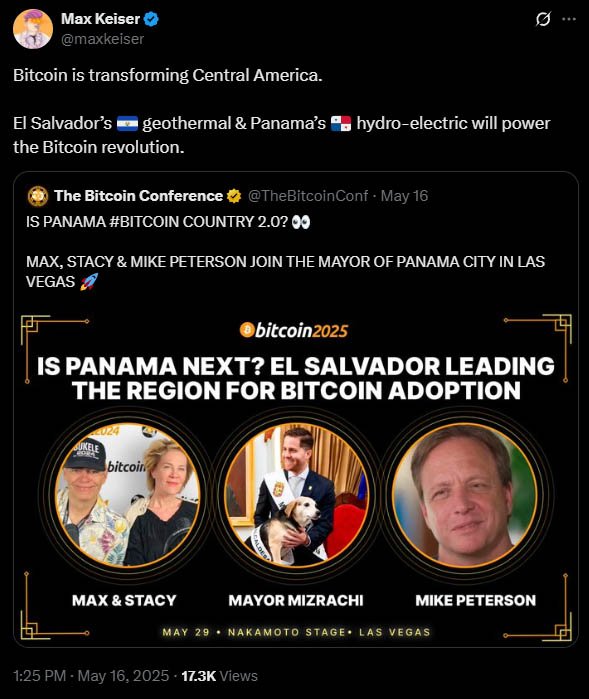Panama City may be the next Latin American city to adopt bitcoin, after El Salvador.
Panama City Mayor Mayer Mizrachi has got the bitcoin world excited after hinting that the city might have a bitcoin reserve. The speculation started on May 16 when Mizrachi posted a simple but powerful message on X:
Two words. That’s it. What makes it special is that it came after a high-profile meeting with Max Keiser and Stacy Herbert, two key figures behind El Salvador’s bitcoin strategy.
Keiser is an advisor to El Salvador’s President Nayib Bukele and Herbert leads the country’s Bitcoin Office.
El Salvador became the first country to adopt bitcoin as legal tender back in 2021. Since then, it has been building a national bitcoin reserve, currently holding 6,179 BTC worth around $640 million. It’s also using geothermal energy to power bitcoin mining in an eco-friendly way.


Mizrachi’s meeting with Keiser and Herbert was about how Panama could do the same. While the details of the conversation are private, Keiser shared on social media that the two countries will play a big role in the future of Bitcoin.
“Bitcoin is transforming Central America,” Keiser wrote. “El Salvador’s geothermal & Panama’s hydro-electric will power the Bitcoin revolution.”


Panama with its hydroelectric power could be a hub for green bitcoin mining.
Mizrachi has not announced a bitcoin reserve plan nor submitted a proposal to the National Assembly. But his post and public appearances suggest it’s being considered.
He will be speaking at the upcoming Bitcoin 2025 Conference in Las Vegas just days after his social media post. Many expect he will share more about Panama City’s bitcoin plans during his talk.
If Mizrachi pushes for a bitcoin reserve, he will need to work with national lawmakers to pass new legislation. So far, there is no evidence of that.
Even without a bitcoin reserve, Panama City is already going big on digital assets.
In April 2025, the city council approved a measure to allow residents to pay taxes, fees, fines and permits with digital currencies. Supported tokens are bitcoin (BTC), ethereum (ETH), USD Coin (USDC) and Tether (USDT).
To comply with financial laws, the city has partnered with a bank that instantly converts these digital assets into U.S. dollars. According to Mizrachi, this way it’s easier for residents to use digital assets and the city’s financial operations will be transparent and legal.
Another part of the meeting with El Salvador’s advisors was education.
Stacy Herbert confirmed that Panama City will be integrating El Salvador’s financial literacy book, “What is Money?” into their digital library system. The goal is to help students, teachers and the general public understand bitcoin and digital currencies in modern finance.
This is a trend in Latin America where countries are looking for alternatives to traditional banking systems. Inflation, economic instability and the rise of decentralized finance are forcing governments to look into new financial tools.

